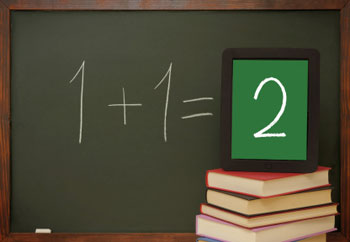Elementary Concepts: Third Grade Math
Are you interested in finding out what math skills your child should master by the end of the third grade? Read on to discover the mathematical concepts that are important for students in this age range to master.

Third graders are presented numerous new skills and concepts in school. It is imperative for parents to monitor their child's progress and keep an eye out for skill gaps. This is especially important in mathematics because the skills a child learns in their third grade math class will be used throughout their entire life.
Students should not only be able to read numbers from 0 to 1000 but they should also be able to compare and order these numbers, as well as mentally add and subtract numbers up to around 20. Students need to have a firm understanding of place values, addition and subtraction, multiplication and division. They should be able to add and subtract coins and understand basic word problems.
Children in grade three are expected to understand and be able to use measurement terms such as inches, feet, yards and meters. They should be able to make accurate measurements with the appropriate tools. Third graders should understand temperature and time. Although your child is in elementary school, they are expected to comprehend many of these fundamental mathematical concepts to almost the same degree as you do as an adult.
Third graders should already understand and be able to describe and construct two dimensional and three dimensional objects from various supplies such as pipe cleaners. At year's end a third grade student will be working with lines of symmetry and transformations, completing geometry puzzles and learning about graphs and grids.
Third graders learn to identify patterns and relationships in systems such as weather and automobile traffic. As a parent you can encourage your student to identify and describe the patterns they see in the world around them and try to provide a rule for the pattern. This will strengthen your child's logic and higher reasoning skills.
By the third grade, children should be able to use graphs and diagrams and collect the information used in these charts to conduct probability experiments. These usually involve seemingly trivial experiments like coin tosses, but the mastery of these concepts is not trivial; it is very important for a third grader to understand these skills in order to progress to fourth grade.
Your state may require additional math skills not mentioned in this article. Many states use standardized tests to assess a child's progress and even to determine if that child should be allowed to progress to the next grade. Find out more about the standards outlined by your state board of education. Your child's math teacher or school district should be able to provide you with all the information you will need.
Other Articles You May Be Interested In
-
Elementary Concepts: Third Grade Math

Are you interested in finding out what math skills your child should master by the end of the third grade? Read on to discover the mathematical concepts that are important for students in this age range to master.
-
MIND Games Lead to Math Gains

Imagine a math teaching tool so effective that it need only be employed twice per week for less than an hour to result in huge proficiency gains. Impossible, you say? Not so...and MIND Research Institute has the virtual penguin to prove it.
We Found 7 Tutors You Might Be Interested In
Huntington Learning

- What Huntington Learning offers:
- Online and in-center tutoring
- One on one tutoring
- Every Huntington tutor is certified and trained extensively on the most effective teaching methods
K12

- What K12 offers:
- Online tutoring
- Has a strong and effective partnership with public and private schools
- AdvancED-accredited corporation meeting the highest standards of educational management
Kaplan Kids

- What Kaplan Kids offers:
- Online tutoring
- Customized learning plans
- Real-Time Progress Reports track your child's progress
Kumon

- What Kumon offers:
- In-center tutoring
- Individualized programs for your child
- Helps your child develop the skills and study habits needed to improve their academic performance
Sylvan Learning

- What Sylvan Learning offers:
- Online and in-center tutoring
- Sylvan tutors are certified teachers who provide personalized instruction
- Regular assessment and progress reports
Tutor Doctor

- What Tutor Doctor offers:
- In-Home tutoring
- One on one attention by the tutor
- Develops personlized programs by working with your child's existing homework
TutorVista

- What TutorVista offers:
- Online tutoring
- Student works one-on-one with a professional tutor
- Using the virtual whiteboard workspace to share problems, solutions and explanations